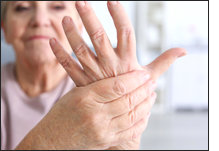How Fine Motor Skills Change with Age
There are certain changes to be expected with age. Wrinkles appeared on our skin and our hair starts to turn gray. Our metabolism slows, causing unwanted weight gain if we don’t adapt our diet. It takes longer to walk from point A to point B, and it takes less time to grow short of breath as we exert ourselves. Our vision and hearing can decline as well, and our taste buds diminish in size and quantity the longer we live.What we might not associate with aging is change in our fine motor skills. What was once easy for us to manage on a regular basis can become quite the difficult feat to muster. Changes in fine motor skills can cause seniors to stop engaging in favorite hobbies, such as knitting, sewing, woodworking, or even gardening. Cooking and baking can become a challenge as they struggle to open jars or other ingredients. Even taking medications can cause them pain as they have difficulty manipulating pill boxes or containers.

It’s important for seniors and their families, as well as caregivers, to understand how fine motor skills change with age. By taking the time to understand, families and caregivers can show empathy and patience while waiting for their aging loved one to complete a task that involves their fine motor skills. Here are a few ways our fine motor skills change with age, and suggestions to help your aging loved one improve their fine motor skills.
Tremors
Although tremors can be caused by Parkinson’s disease or as a result of a stroke, tremors are known to occur more frequently with advancing age. Seniors are more likely to experience active tremors—shakiness that occurs during an action, such as reaching for an object, writing a letter, or while drinking a glass of water.
To reduce active tremors, seniors should practice relaxation techniques. This helps them to calm their bodies by honing in on their extremities. Seniors can also practice relaxation through finger painting. Finger painting is very therapeutic and provides an outlet for seniors to express their emotions.
Dexterity
Another change in fine motor skills that occurs with age is a change in dexterity. Seniors are more likely to experience a decline in dexterity, meaning that it’s more difficult for seniors to manipulate objects. This may seem like a small loss but losing dexterity can have a big impact on a senior’s independence. Simple tasks, such as buttoning a shirt or tying shoes, can become very challenging as a senior’s dexterity decreases.
Dexterity can be improved through practice. Engaging in household chores is an easy way to practice dexterity. Encourage your aging loved one to help fold laundry or reorganize shelves. Give them time and space to button their own jacket or shirt.
Arthritis
Arthritis is another common contributing factor to a senior’s change in fine motor skills. While not a disease, arthritis refers to the joint pain or joint disease that many seniors experience in older age. There are many forms of arthritis, but seniors are more likely to experience osteoarthritis, or joint pain due to wear and tear. Any form of arthritis is painful and makes it difficult for any senior to complete everyday tasks, such as grooming or chores.
The pain of arthritis is best relieved through a pain management regime prescribed by your aging loved one’s primary care physician. However, between doses, encourage your aging loved one to manipulate play dough. Either purchase it from the store or make your own homemade batch. This is a wonderful activity to do with a senior with memory loss and a great activity to promote circulation.
Grasping
Seniors can also lose strength in their hands as they grow older. Sometimes, the decline in grip strength can occur as early as the age of 50. A decline in a senior’s ability to grasp is rather common and is associated with a decline in muscle mass. This only makes it more difficult for seniors to perform common tasks and necessitates adaptations so that a senior can maintain their independence.
Grip strength can be improved through simple hand exercises. Purchase a stress ball that your aging loved one can squeeze while watching television. Another fun way to improve muscle strength and grasping skills is to create a no-sew fleece blanket. Tying the fleece strips together helps strengthen finger strength, while working to improve all fine motor skills.
If you’ve noticed your aging loved one struggling with their fine motor skills, know that Visiting Angels Sheboygan is here to help. As stated above, the decline in fine motor skills can cause a senior to lose their independence. However, with the assistance provided by our compassionate caregivers, your aging loved one can maintain their independence in the comfort of their own home. We provide a variety of non-medical senior home care services that promote safety and well-being. From assistance with grooming and bathing, to helping with laundry or light housekeeping tasks, we are here for you. Please contact us to learn more about how our senior home care services and how we can partner together.
